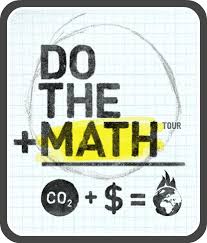The case for Catholic fossil fuel divestment
This is the first in a series of articles designed to educate Catholic organizations about ways to participate in the fastest growing divestment campaign in human history – the fossil fuel divestment movement.
This is the first in a series of articles designed to educate Catholic organizations about ways to participate in the fastest growing divestment campaign in human history – the fossil fuel divestment movement. It was published in the May-June 2018 issue of NewsNotes.
Read Part Two: Ways to go about it
Read Part Three: Learning from others
Read Part Four: Addressing critiques
The first fossil fuel divestment campaign began in 2010 when a group of students at Swarthmore College in Philadelphia, incensed after seeing the destruction wrought by coal companies during a class trip to Appalachia, launched a divestment petition to their school. Students on other campuses, with the help of the Wallace Global Fund, organized similar campaigns in 2011.
It was not until a part-time environmental studies professor at Vermont’s Middlebury College, Bill McKibben, wrote an article for Rolling Stone magazine and carried out a speaking tour in 2012, asking people to “Do the Math” on climate change, that the campaigns turned into a movement.
McKibben’s main point was in order to avoid the worst of climate change and maintain global temperatures within two degrees Celsius of pre-industrial times, which would later become the rate in the 2015 Paris climate accord, the world can release no more than 565 gigatons of carbon dioxide into the atmosphere. The live update of what remains of this number is published online by The Guardian as the “carbon countdown clock.”
At the time of McKibben’s tour, fossil fuel companies already had 2,795 gigatons of proven fossil fuel reserves that they planned to sell. This means that to stay within two degrees, close to 80 percent of these companies’ reserves cannot be used.
The numbers reveal as McKibben says, “that the fossil fuel industry’s business model is in fundamental conflict with life on earth.” The reasons for divesting have since settled into two camps: moral and economic.
Moral reasons to divest
Many Catholic institutions cite Pope Francis’ teachings in Laudato Si’ as a key motivator for divesting. Without specifically naming fossil fuel divestment in the letter, the pope lays out the arguments for it.
First, the need is urgent: “We know that technology based on the use of highly polluting fossil fuels – especially coal, but also oil and, to a lesser degree, gas – needs to be progressively replaced without delay.” (165)
Second, we cannot depend on governments and businesses to act: “Politics and business have been slow to react in a way commensurate with the urgency of the challenges facing our world.” (165) “The failure of global summits on the environment makes it plain that our politics are subject to technology and finance. There are too many special interests, and economic interests easily end up trumping the common good and manipulating information so that their own plans will not be affected.” (54)
Third, consumer boycotts “prove successful in changing the way businesses operate, forcing them to consider their environmental footprint and their patterns of production. When social pressure affects their earnings, businesses clearly have to find ways to produce differently.” (206)
Other Church leaders have named the fact that while the poorest communities around the world are least responsible for creating climate change, they bear the brunt of its force. “The poor are suffering greatly from the climate crisis and fossil fuels are among the main drivers of this injustice,” said Cardinal Luis Tagle, Archbishop of Manila and President of Caritas Internationalis. “That is why Caritas Internationalis has decided not to invest in fossil fuels anymore.”
Finally, Catholic institutions can make a significant impact in caring for the planet. Trocaire, the Irish Church’s relief and development agency, wrote in its manual on divesting, “There is possibly no other global institution as well placed to show prophetic and practical leadership at this critical moment.”
Economic reasons to divest
If 80 percent of reserves cannot be used without catastrophic effects on the climate, then the current valuations of fossil fuel companies are, as the Institute and Faculty of Actuaries described them in 2013 “fundamentally flawed and the assets are ‘stranded’.”
This creates a carbon bubble estimated at more than $2 trillion that will undoubtedly pop someday. “There are already many significant examples of how assets have been stranded by environment-related risks and then hit investor returns,” Dr. Ben Caldecott, director of the University of Oxford’s Sustainable Finance Program, said in 2014. He offered three examples: renewable energy depressing power prices and impacting utilities in Europe; shale gas stranding coal assets in Australia and the U.S.; water constraints and air pollution concerns stranding coal assets in China.”
Over the last five years, credit rating agencies like Moody’s and Standard & Poor’s have placed the ratings of fossil fuel companies on review for a possible downgrade. Whether for economic or moral reasons, it clearly appears that the time to divest is now.
Image: “Do the Math,” logo for a 45-minute film produced by 350.org based on the lecture Bill McKibben first presented in 2012. Watch online.

